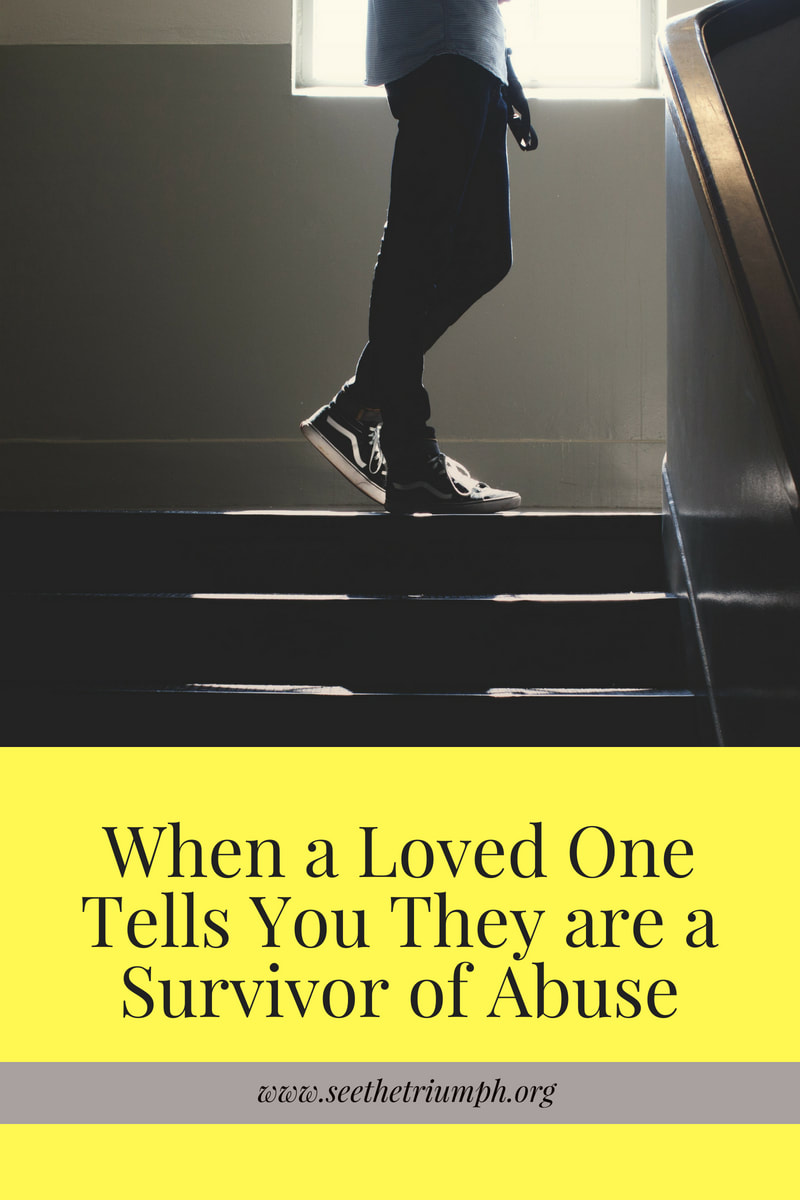|
By Katie Lloyd, See the Triumph Guest Blogger 1. Don’t blame them for the abuse Many survivors of abuse worry that they will be blamed for the what their abuser did to them. They may have experienced this before, as many abusers blame their victims for “making them” abuse them. Absolutely avoid comments that imply that the survivor was to blame. Some of these comments include: “What did you do to make him/her so angry?” “You’re both responsible for your problems” “What did you expect? You chose to stay with him/her, marry him/her, etc.” Abuse is always the fault of the abuser, not the victim. 2. Be kind and empathetic - choose your words carefully You have a unique and powerful opportunity when a survivor shares their story with you. You can respond in a way that supports them and helps them to heal from the abuse. Share what feels natural to you, whether that is letting them know they didn’t deserve the abuse, telling them how much they mean to you, or acknowledging how painful this must have been. 3. Don’t push for details How much detail to share about the nature or specifics of the abuse is up to the survivor. It can feel invasive to be asked about details, and it’s best to let the person you’re talking to share the information that they feel comfortable sharing. 4. Check in about safety It’s always a good idea to check with the survivor you’re speaking with to see if they have any concerns about their safety. The abuse may have ended years ago, but for some survivors the safety risks persist. Ask if there’s anything you can do to help them feel more safe. 5. Reach out Some survivors worry that sharing their story will cause others to treat them differently. In addition to asking what you can do to support them, you might consider reaching out and inviting them to do an activity or just giving them a call to chat. Let them know that you don’t judge them for the abuse. 6. Take care of yourself It can be extremely emotionally difficult to hear stories of abuse, and to hear that this has happened to someone you know can be devastating. You may feel a variety of emotions such as anger, sadness, guilt, and helplessness. All of those emotional reactions are normal and okay. It may help to acknowledge these emotions and take time to do something kind for yourself. 7. Just listen One of the most simple but powerful things you can do for someone sharing something painful with you is to just listen to them. This can be easier said than done, especially when you are trying to manage your own reactions to what they’re saying. To the best of your ability, let them speak and really hear what they are telling you. 8. Respect their privacy Someone who has chosen to share their story with you has placed a great amount of trust in you. Always check with them before talking about their story with someone else. Even people who you think know about the abuse may not. Ultimately, the survivor is the one who gets to decide who hears their story. 9. Try to stay calm You may feel very angry when you hear about the abuse, but keep your temper under control and avoid acting violently or aggressively. For many survivors of abuse, anger is scary and can be a reminder of the abuse even when it is not directed at them. If you feel yourself getting overwhelmed you could ask to take a break from the conversation to calm down. 10. Empower Abuse can be an incredibly disempowering experience. You have the opportunity to remind the person you’re speaking to how strong they are to have survived this experience and to speak out about it now. Katie Lloyd recently graduated with a Master of Science in Counseling and Educational Development from the University of North Carolina at Greensboro with a specialization in Couple and Family Counseling. In her spare time Katie enjoys playing with her dog and traveling.
Comments are closed.
|
Archives
July 2024
CategoriesAll About Intimate Partner Violence About Intimate Partner Violence Advocacy Ambassadors Children Churches College Campuses Cultural Issues Domestic Violence Awareness Month Financial Recovery How To Help A Friend Human Rights Human-rights Immigrants International Media Overcoming Past Abuse Overcoming-past-abuse Parenting Prevention Resources For Survivors Safe Relationships Following Abuse Schools Selfcare Self-care Sexual Assault Sexuality Social Justice Social-justice Stigma Supporting Survivors Survivor Quotes Survivor-quotes Survivor Stories Teen Dating Violence Trafficking Transformative-approaches |
Search by typing & pressing enter



 RSS Feed
RSS Feed